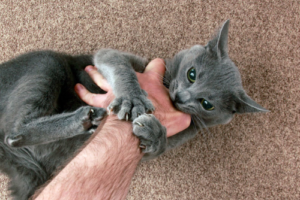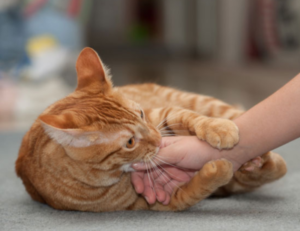 Why Does My Cat Give Me Love Bites?
Why Does My Cat Give Me Love Bites?
Biting is a form of communication for cats. They can also bite for reasons such as fear, defensiveness, or aggression. Nonetheless, cat love bites can be a way of your cat letting you know that they are unhappy, you have a sensitive spot, or it’s time for you to stop the petting session. Cat love bites usually start as licks and transition into gentle nips and nibbles that don’t break the skin. Although cat love bites are not too hard, they can be startling and painful as the cat’s teeth are sharp. Cat love bites often happen during a petting session and they are a common behavioral problem with many pups. Understanding this behavior can help cat owners understand their cat and what it is trying to communicate. They can also be unintentional as part of the cat’s grooming process.
Here are some of the reasons why you get cat love bites from your beloved furry friend:
-
Overstimulation
Your cat giving you love bites can be a sign of overstimulation and she is letting you know that it is time to stop gently. If you have been petting your cat only to have their gentle nibbles suddenly escalate into a harder bite, the cat may be experiencing overstimulation. You may notice this behavior during grooming sessions if you have multiple cats. This overstimulation may result from the sensitivity of the hair follicles after an extended period of petting or pressure. It can begin to hurt leading to discomfort. Gentle nips could be a way of telling you that petting time is over. These warnings may be associated with other signs of discomfort like tail swishing or flicking, flattening of the ears, skin twitching over the back, staring, tenseness, pupillary dilation, or walking away and laying down.
-
A Behavioral Holdover from Kittenhood
Cat love bites are reminiscent of the ways cats and kittens playfully interact with each other using their mouths. It is usually a way of your cat just being playful and using her non-verbal communication skills to let you know that she wants your attention.
-
Play and Aggression
Most kittens play rough. It is not just a form of social bonding but also prepares them for adulthood. Bouts of hunting and mock stalking lead to pouncing and biting. Cat love bites can take place when your kitten is aggressively playing with you, especially if she doesn’t have another kitty playmate. Paying attention to your cat enables you to tell the difference between aggressive playtime and real aggression. If the cat is not hissing or growling, her excitement is escalating. It is essential to remember that her play drive is connected to the prey drive.
Playing rough with your kitten can directly result in unwanted aggression when she becomes an adult. Cat love bites from kittens are funny unlike ones from adult cats that might cause swelling and infection. You can change the behavior of a cat that gets a bit too mouthy with cat bites during play. Also, ensure that you don’t play with your cat using hands but instead use a toy with a string or wand.
Related Post Best Interactive Cat Toys.
-
Cat Love Bites Indicates Joy of Being Petted
A cat can give you love bites as you pet it. It is an affectionate behavior and is not usually meant to hurt you.
-
Restores Dominance
Cat love bites may also have to do with restoring dominance. Cats who are related or very friendly with each other do engage in mutual grooming referred to as allogrooming. This is a social activity that shows affection and reinforces a hierarchy. All the grooming attention is usually focused around the neck and head and the cat being groomed will usually turn his or her head toward the affection, much like when she is being petted. The groomer may nip the groomee as a way of gently reminding her who is in charge.
-
Responding to a Threat
In some situations, cats may bite as they are directly responding to a threat or asserting their dominance over a particular being or a situation. In such situations, the cat love bites are more likely to be harder and may run alongside other aggressive behavioral patterns.
-
Stopping Unwanted Action
Cat love bites are a way of informing you to stop doing something that she doesn’t like. For instance, it can be brushing their teeth or trimming their nails. She may continue repeating the behavior in the future once she knows that it will stop you.
-
Form of communication
Cat love bites are a form of communication. Your cat’s instinctual nature drives her to give these little nips especially when she feels overexcited. She may also be driven to engage in this behavior in times when she feels a strong sense of bonding.
Read About Best Cat Treat Dispensers with Camera.
 How to Stop Your Cat from Giving You Cat Love Bites
How to Stop Your Cat from Giving You Cat Love Bites
-
Play with the Cat Regularly
Your cat is a natural hunter and you must provide an outlet for their predatory instincts. You should have a habit of playing with the cat every day for a few minutes. This allows your feline to scratch and bites something without leading to any harm. For kittens, it is important that you begin playing with them from a young age as doing so will make it less likely that they will love bite anyone when they become an adult.
-
Look Out for The Warning Signs
There are usually some warning signs that show that your cat is about to bite. Look out for this body language as one of the best ways to avoid getting bitten. Their tail for example may start thrashing around, their ears might be pinned back and pupils dilated. The better you can read your cat’s emotions, the less likely it is going to bite you.
-
Figure Out What Is Causing the Problem
This greatly helps you to know why your kitty is giving cat love bites in the first place. If it is a way of responding to a stressful situation, you can take steps to avoid repeating it. Avoid touching it if it doesn’t like to be touched in a certain place. If the cat is responding to being startled, avoid making any jerky movements that could upset them.
-
Know When to Stop Playing
You need to be ready to stop a play session if needed. If your four-legged friend looks like she is about to bite, get your hands well out of the way. If the cat does manage to sink its teeth in, say no firmly and safely get away from her. Eventually, your cat will start to learn that biting is a surefire way to complete a play session early and will stop doing it.
-
Avoid Using Negative Reinforcement Techniques
Avoid techniques such as a spray bottle or shock mat as this can worsen the issue. Your kitty may start to be frightened of you, hiding whenever you get close. You may even cause more fear, anxiety, and aggression. The same applies to yelling at your cat. Behaviors that are stress-related in a cat include urinating outside of the litter box or showing real aggressive behavior towards people in the household.
-
Keep Petting Sessions Brief
Also, ensure that you pause frequently during these sessions so to gauge the cat’s interest. Also focus petting on areas that cats generally enjoy such as around the ears, under the chin, and avoid areas such as the belly or near the tail.
Read About Best Catnip Toys Cats.
How to Deal with Cat Love Bites
- Try to correlate the cat love bites with any behavior on your part. Some cats become agitated with petting, chin rubs among others. If you can link the cat love bites to your petting or rubbing the cat, then you can stop the behavior and see if there is a change.
- Never use punishment on a cat who love bites. Doing so only serves to agitate the cat further and can escalate the biting. Instead, use a reward system like treats when the cat shows appropriate behavior
- Use toys to interact with your cat in a manner that is hands-free to encourage bonding without the cat love bites.
- Provide environmental enrichment for your cat every day. This is especially true for cats that live alone and whose owners need to work long hours outside the home. You can use videos of birds and small mammals, mazes, cat treat balls, and other amusements to keep your cat entertained even in your absence. This helps greatly in reducing stress.
- Do not quickly pull your hand away. Cats are designed to track movement and are often revved up by a hand, foot, or ankle that is moving since they are visual predators. Failure to pull your hand away is counter-intuitive, however, lack of movement often stops the behavior.
You may also like Best Gifts for Cats.
Conclusion
Cats show their feelings and emotions in various subtle ways. Cat love bites is a common behavior in cats that occurs due to several things. It can be managed by studying your cat’s body language and learning to redirect undesired behaviors and respecting her tolerance for contact. It is important that as a cat owner, you pay attention to what your furry friend does as she is always letting you know how she feels.
See Also How Cat Show Love.
